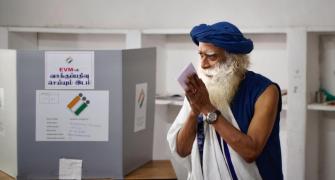US Secretary of State Hillary Clinton has reached out to her counterparts of more than a dozen countries, including Indian External Affairs Minister S M Krishna, as the Obama Administration stepped up its effort to increase pressure on the Syrian regime.
Besides Krishna, Clinton also reached out to her counterparts in Qatar, Bahrain, Egypt, Russia, Brazil, France, Germany, Britain, Norway, Canada, Japan, Jordan, South Korea, Turkey and Saudi Arabia, State Department spokesperson Victoria Nuland told reporters at her daily news conference.
These calls were made over the past few weeks, she said.
"This has really been a preoccupation of this spring and summer period, and I think we see the results, but also in large measure because despite the growing pressure from the international community, they have been on the phone constantly. So despite this growing pressure, despite the calls around the region, the fact that the violence hasn't stopped has also encouraged more voices," she said.
Indian Permanent Representative to the UN Hardeep Singh Puri, had on Thursday said that the Security Council will take "appropriate decisions" on Syria after it hears a briefing from the world body's human rights chief on the crisis in the strife-torn country.
India holds the rotating presidency of the 15-member UN Security Council this month.
Last week, an IBSA delegation comprising Additional Secretary for International Organisations at the Indian Foreign Ministry Dilip Sinha, Deputy Minister of International Relations and Cooperation of South Africa Ebrahim Ebrahim and Brazil's under secretary for Middle East affairs Paulo Cordeiro went to Damascus to discuss the current situation in Syria and the way forward.
Earlier, President Barack Obama asked Syrian President Bashar Al-Assad to step down, and slapped another round of sanctions against Syria.
"The net effect of the sanctions that we have imposed is to close the US financial sector to Syria -- combination of the freeze on all Syrian government assets that are subject to US jurisdiction, prohibiting US persons anywhere, under any authority, to engage in transactions involving the government of Syria, and then striking at the stream of revenue to the regime by banning imports of Syrian origin -- petroleum and petroleum products -- into the United States," Nuland said.
"So this is a closing of the US financial system to Syria. And of course, as we've said, we look to other countries to match what we have done and to look at how they also can take national steps to tighten the noose," she said.
"I think our first priority is to see other countries around the world with companies operational in Syria take national measures. Our hope and our expectation is that in the coming weeks and months and -- weeks and days, more countries will take such action," she said.
Nuland said in all of these countries in the so-called -- experiencing the so-called Arab Spring, the policy of the Obama Administration has been grounded in its commitment to the right of all people to peaceful protest; it's commitment to universal human rights of speech, assembly, the right to have a say in how one is are governed; and the obligation of governments to be responsive to the calls of their people for reform, aspirations of their people.
Those are the undergirding principles, she said.
"In the case of Egypt, We had deep economic and political and other military contacts, which allowed us, working with those Egyptians who wanted change, including those Egyptians in the system who wanted change, to support them in the quick transition that they had, which, blessedly, was far less bloody and far less protracted than what we have seen in Syria," she said.
"The situation in Syria is different both in terms of US influence versus the influence of other neighbors; in terms of the need to build a coalition, which has taken time and in terms of the ability of the Syrian people themselves to quickly exact the kind of change that Egypt was able to bring about, given the 40-year dictatorial rule of the Assad family, and the fact that they really had been living in a politics-free zone and have to build from scratch a movement for change," Nuland said.








